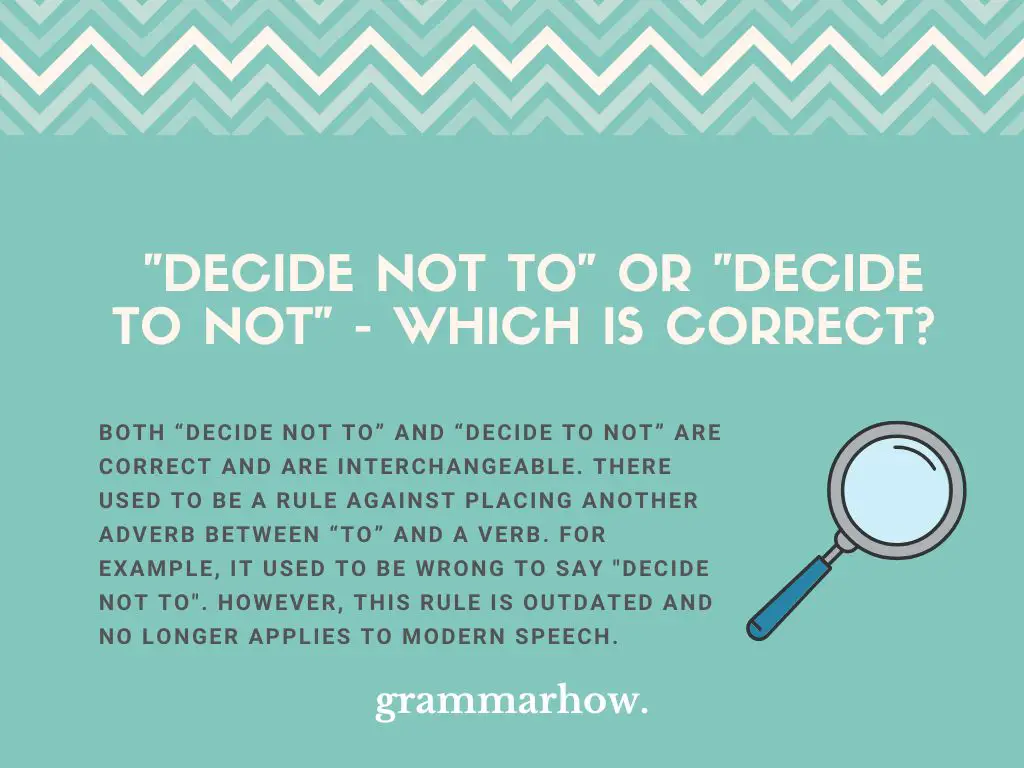In everyday speech, you are very likely to come across both expressions “Decide not to” and “decide to not”. It can be a problem to decide which of them is correct. Therefore, in this article, we will examine both expressions and offer explanations on how they can be used.
“Decide Not To” or “Decide To Not” – Which Is Correct?
Both “decide not to” and “decide to not” are correct and are interchangeable. There used to be a rule against placing another adverb between “to” and a verb. For example, it used to be wrong to say “decide not to”. However, this rule is outdated and no longer applies to modern speech.

“Decide Not To” and “Decide To Not” are both expressions you are likely to come across in everyday conversations. They both have the same meaning. You use them when you mean to say that you will refuse to do something or have refused to do something.
Depending on which of the expressions you have been exposed to, the other might seem absurd when you hear it.
Generally, it is better to go with the expression that sounds more natural to you. For some people, it is “decide not to”. For others, it is “decide to not”.
Nonetheless, it is important to note that the old rule against placing an adverb between a verb and an infinitive verb does not apply any longer.
Decide Not To
The expression “decide not to” means to choose not to do something. It is used when you want to say that you have resolved to stop doing an action or refuse to start that action at all. It is grammatically correct, and can be used either formally or informally.
Here are some examples of how to use “decide not to” in a sentence:
- I think we can all agree that deciding not to go to the carnival last month was a terrible idea. We missed out on so much fun!
- After considering all that has happened these past few days, I have decided not to participate in the upcoming inter-faculty debate competition.
- Is it possible to cancel my subscription? I have decided not to proceed with the previous arrangement.
- Is there any particular reason why you have decided not to pursue a degree in business management?
- I decided not to tell you about the accident because you would have panicked and blown it out of proportion.
- I decided not to continue going for my appointments with the therapist despite the excellent references I got for her services. I did not enjoy the sessions we had.
- Even if you decide not to go through with the plan, I will be here to support you.
Decide To Not
The expression “decide to not” means that you have chosen to not do something. It is used when you want to talk about an action that you have resolved to neglect. Most people use it particularly when they wish to lay emphasis on their refusal to do a particular act.
“Decide to not” is grammatically correct and used mostly in informal conversation.
Here are some examples of how to use “decide to not” in a sentence:
- If you think deciding to not talk to any of your siblings will automatically resolve all your issues, then you are wrong.
- I have decided to not participate in the next class we have on this topic. I find it rather boring.
- I have decided to not proceed with the surgery. Please cancel my appointment.
- Shawn decided to not pursue the matter after Rob made it clear that it was a sensitive issue for him.
- I’m glad I decided to not tell you about the car until I had confirmed when it would ship. You would have only been disappointed.
- I decided to not continue making excuses for my wife’s behavior and instead, told her to face her fears.
- You can’t just decide to not go for your sister’s wedding without first trying to discuss your issues with her.
Which Is Used The Most?
According to Google Ngram Viewer graph, the expression “decide not to” is used more often than the expression “decide to not”. The graph shows that “decide not to” has enjoyed wider acceptance by the majority of English Language speakers.

The reason for this is probably the old rule that prohibits placing another word between “to” and its infinitive verb. This must have made “decide to not” to be grammatically incorrect for a very long period of time. The expression is now being more widely accepted as this rule becomes obsolete.
Another reason could be the fact that “decide not to” sounds more natural than “decide to not”. This makes the former more widely accepted than the latter.
Is It “I Decided Not To Answer” Or “I Decided To Not Answer”?
Both expressions are correct and can be used interchangeably. You might decide to say “I decided not to answer” when speaking, to mean you chose not to answer. “I decided to not answer” also means the same, but can be used when you want to place emphasis on “not answer”.
Generally, you can use both expressions interchangeably in sentences. They are both grammatically correct.
Observe the following sentences:
- I heard the phone ringing but I decided not to answer it.
- I heard the phone ringing but I decided to not answer it.

Martin holds a Master’s degree in Finance and International Business. He has six years of experience in professional communication with clients, executives, and colleagues. Furthermore, he has teaching experience from Aarhus University. Martin has been featured as an expert in communication and teaching on Forbes and Shopify. Read more about Martin here.
